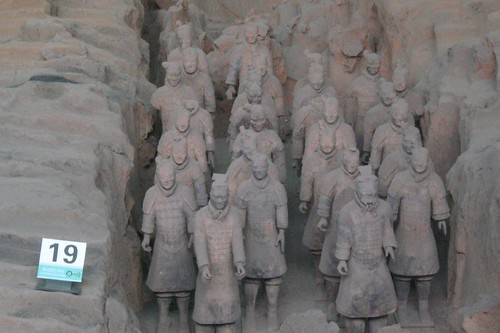I am just back from visiting the "terracotta soldiers" at the tomb of Qin Shi Huan, the first emperor and representative of the Quin dynasty. As generally known he was buried with more than 7000 Terracotta soldiers to be mighty also in the afterlife. He was also buried with 100 s of acrobats, chefs and all the other people that were necessary to assure the used lifestyle of the emperor. I am not knowledgeable enough for being sure if at the end really only the terracotta duplicates have been buried or also the living people who had that function. But anyway, the site is impressive and impressive is also the puzzle work of the Chinese Archeologists to put together again the pieces. It is also nice arranged to make clear how they found the tombs and how they reconstructed the figures. The peasant who found the first piece is now signing books in the shop. I discussed with my guide the madness of this enterprise. Qin Shi Huan did force nearly all the productive forces of his empire into labor to create the ingredients for his luck in the netherworld. Most probably he created therefore the hell in this world for most of his subjects! If all this energy would had been directed into improving the real life of the real people. But we would not have found this immense richness and cultural witness of the life from more than 2500 years ago.  I am aware: also the most impressive historic buildings of western society are products of religious superstition or expressed in a more sympathetic way are expression of the tragic of life, churches and monasteries.. (but this is not true for the greek and roman world, the Colosseum, Piazza Navoan and the Terme di Caracalla are much bigger and more impressive than any temple)... See all photos from my visit to the terracotta soldiers at my FlicR site
I am aware: also the most impressive historic buildings of western society are products of religious superstition or expressed in a more sympathetic way are expression of the tragic of life, churches and monasteries.. (but this is not true for the greek and roman world, the Colosseum, Piazza Navoan and the Terme di Caracalla are much bigger and more impressive than any temple)... See all photos from my visit to the terracotta soldiers at my FlicR site
"I have approximate answers and possible beliefs and different degrees of certainty about different things, but I'm not absolutely sure of anything..." (Richard Feynman)
